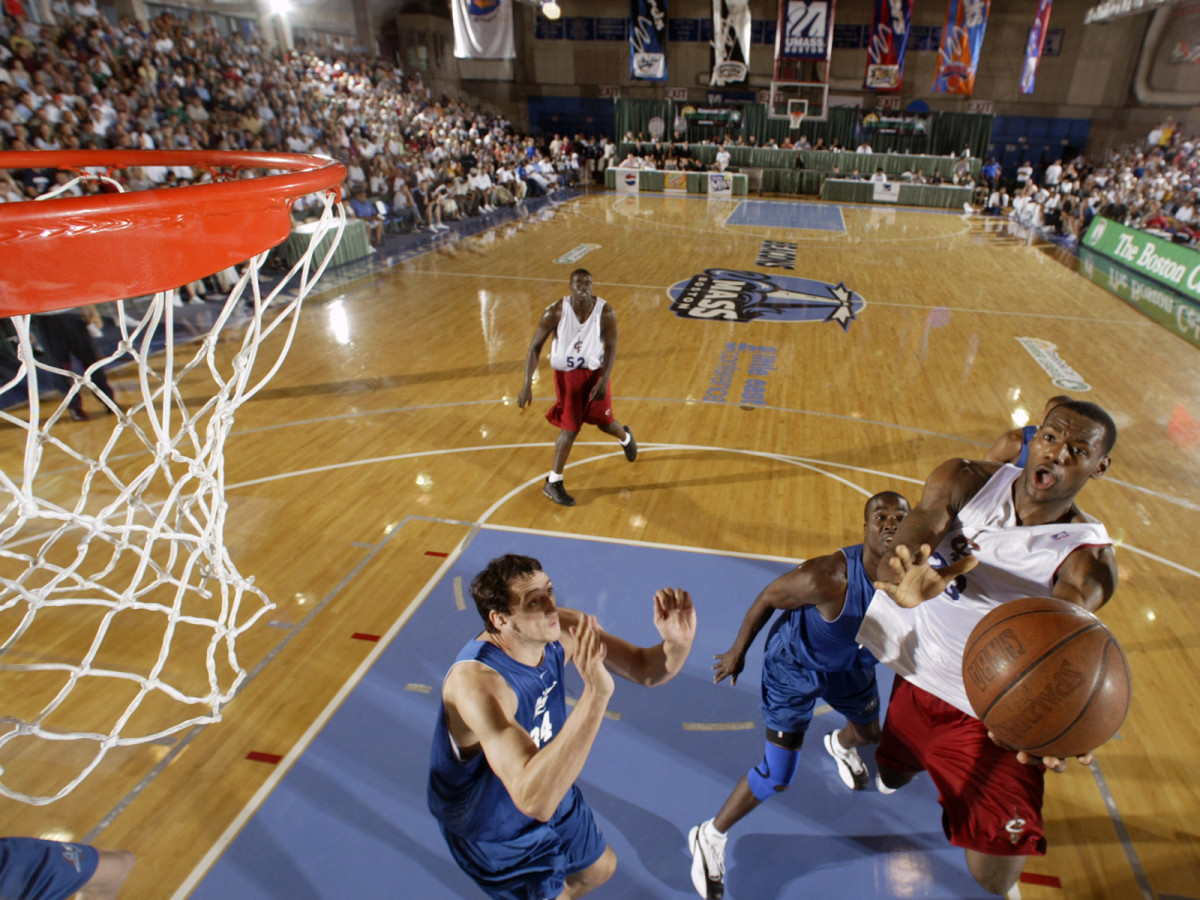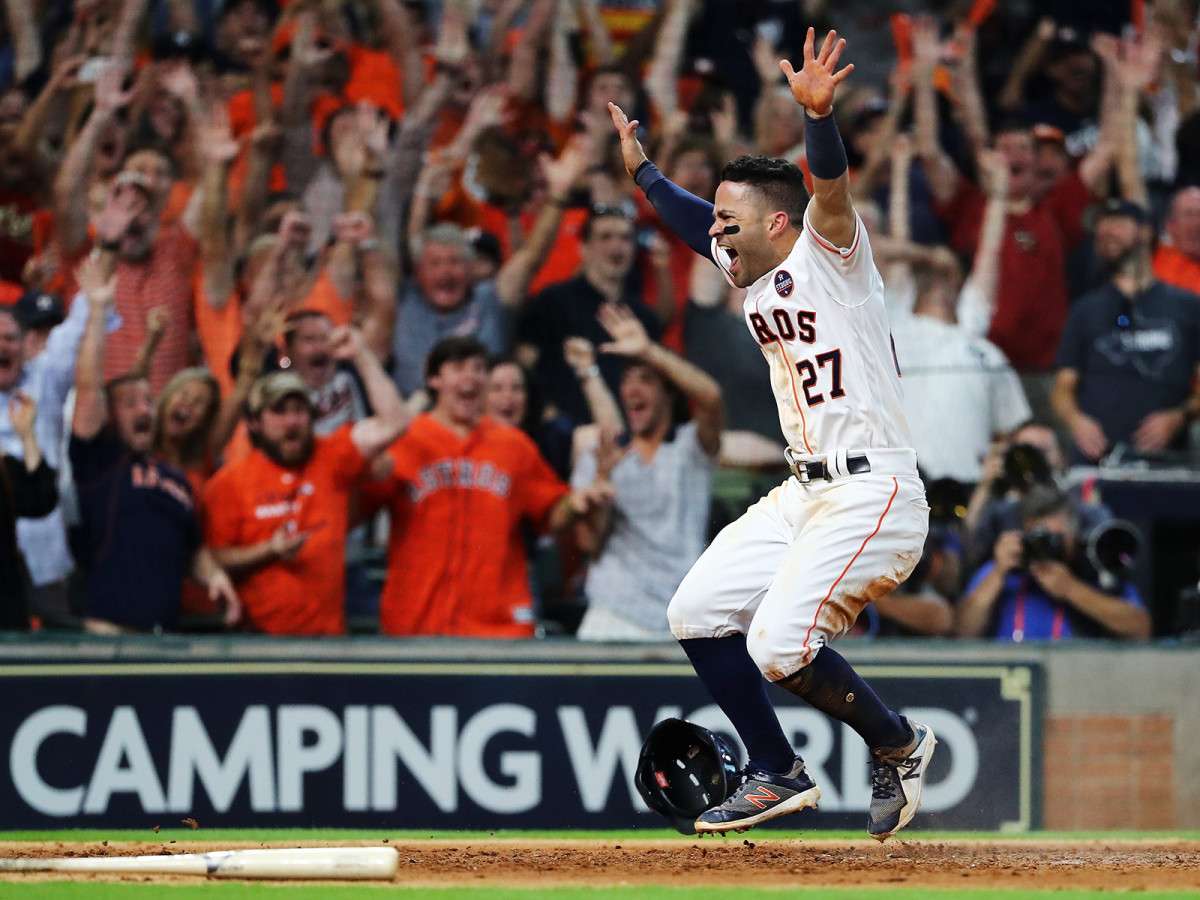Weekend Read: Meet the 'Adopted Son' of NBA Summer League, Astroball's Release and More

MEET JACK COOLEY, AN NBA SUMMER LEAGUE 'LEGEND' IN VEGAS
By Jake Fischer
LAS VEGAS — Late in the fourth quarter of the Suns’ 71-53 Summer League win over the Magic on Monday, Phoenix forward Jack Cooley stepped to the foul line for a pair of free throw attempts. As he dribbled through his foul shot routine, a thunderous “MVP” chant emanated throughout the lower bowl of the Thomas & Mack Center. The free throws gave Cooley 10 points for the evening along with five rebounds and an assist—numbers far from ovation-worthy.
Yet Cooley is somewhat of a Summer League legend. After Philadelphia knocked off Phoenix in the first round of the playoffs on Thursday, the Notre Dame product will play his 32nd career Las Vegas Summer League game in a consolation matchup on Friday, which will tie Dionte Christmas's all-time record. SPORTS ILLUSTRATED caught up with Cooley on Tuesday morning. The following Q+A has been lightly edited for clarity.
SPORTS ILLUSTRATED: There was a debate among media members last night: Do you enjoy getting the Vegas “MVP” chants?
Jack Cooley: Uh, yeah! They’re pretty sick. They’re pretty cool. Yeah, I like them.
SI: You don’t find them patronizing at all?
JC: No, it’s extremely patronizing, extremely patronizing, yeah. But I can’t complain. It draws a lot of attention. It builds hype, which a guy in my situation can need. So like, it is what it is. If I were to say anything to the contrary, people would immediately hate me. So, I kinda just get boxed into a corner and I have to embrace it. It’s OK, though.
SI: As someone who’s also "deceptively athletic" when I play pickup, I can empathize.
JC: Literally today I had a dunk in the practice, and [my teammates] are all like, "Oh, alright!" And I was like, "No, y’all can’t do this too." Don’t do that, man.
SI: It’s like, I’m 6’9”, I can dunk easily?
JC: [Laughs] It’s funny. I embrace it. It’s positive. There are those people on Twitter who are super negative and have no reason to be. So I’d much rather show the people, "Hey man, I was chanting MVP for you last night!" As opposed to, "Hey man, I can do what you do on the basketball court." So, it’s better than that. I’ll take it.
SI: I was standing in the corner of Thomas & Mack by the locker room entrance and I overheard these two kids saying, "Why do we cheer so hard for him?" And one kid said, "Because he’s a legend."
JC: [Laughs] That’s so funny. God, that’s so funny. I figured after five years, this being my sixth, I’m basically the Vegas NBA player. I’m like their adopted son.
SI: With that in mind, I’ve wanted to do a story for so long about the economics of a Summer League invite, with per diem and flights and hotels and gear, teams are basically investing thousands of dollars in you for two weeks.
JC: Dude, people always ask me why I keep doing this. And I go, Alright, if you had a chance to increase the percentage that you get your dream job, and all you have to do is take a paid vacation to Las Vegas, stay in a five-star hotel, and play the game you love, you’re telling me you wouldn’t do that? The economics get pretty nutty. The other day we had a team dinner at Hibachi Grill—which, I love Hibachi Grill. But that’s another like $100 meal right there that is just capped on and it’s just all this stuff.
When I won Summer League with the Bulls [in 2016], they paid for our entire meal at STK and I ordered a steak that was off the menu that cost $200. You can get a free, paid trip to stay in a five-star hotel in Las Vegas. It’s nothing to scoff at for two weeks of work. And as you said, you get all the exclusive practice gear and you get to be on ESPN. There’s a lot of things you get. The per diem is a lot. The Suns do it differently. They give it to you every two days. We’re getting about $260 every two days.
RECOMMENDED READING
• LeBron joining the Lakers is a made-for-Hollywood celebrity marriage: the biggest star joining the league's glitziest franchise. (By Lee Jenkins)
• Who is Kobe Bryant in 2018? He's an entertainment mogul, the coach of his daughter's AAU team and a man with a friendlier mission. (By Lee Jenkins)
• Mike Trout is burning brighter than ever, but nobody seems to be noticing—again. (by Tom Verducci)
• Jerry Westopens up about LeBron going to the Lakers and the allure of L.A. (By Jack McCallum)
• Odell Beckham Jr. headlines SI’s list of the most stylish athletes: The Fashionable 50. (By Jamie Lisanti)
• The men who made the BCS’s infamous computer rankings now work in missile defense, scrutinize D-III softball rankings and keep their numbers alive. (By Joan Niesen)
VAULT PHOTO OF THE WEEK: LEBRON TAKES SUMMER LEAGUE

We're only 15 years removed from LeBron James playing in the NBA Summer League. In 2003 the action was spread out across the country. The photo above was taken at the Clark Athletic Center in Boston while LeBron and his Cavalier teammates played in the Reebok Pro Summer League against the Wizards. Photo taken by Manny Millan.
THE BEST OF THE REST
Editor's note: Below are some of our favorite stories of the week not published by SI. This week's list was curated by Connor Grossman.
• Ken Rosenthal of The Athleticrats out MLB executives with their biggest lies regarding the trade deadline. Find out which prominent figure called Rosenthal’s sources “snitches and bitches.”
• ESPN’s Ramona Shelburne dives deep into the ramifications of LeBron's decision to join the Lakers.
• Ten years after the release of Step Brothers, Alan Siegel of The Ringer delivers an oral history on its creation.
• Why do soccer playersput their hands over their heads after missing a shot? David Gendelman of the New York Times sought out the answer.
• Seth Blanchard and Reuben Fischer-Baum of the Washington Post have a spectacular graphic of one of the World Cup’s most amazing goals.
• In a series on how to make a crossword puzzle, Robyn Weintraub and Brad Wilber of the New York Times delve into writing clues.
• St. Louis Cardinals closer Bud Norris has been harassing one of his younger teammates, and manager Mike Matheney seems to be ... enabling it? Mark Saxon of The Athletic has the story.
THE AUTHORITATIVE STORY BEHIND THE ASTROS' RISE TO STARDOM

By Ben Reiter
Did you know that on the cover of our June 30, 2014 issue, we at SI predicted that the historically awful Houston Astros would turn into YOUR 2017 WORLD SERIES CHAMPS? And that they went and did it?
Well … yes, you probably know that. But what you don’t know is the inside story of exactly how they did it, and what their methods mean for baseball and the broader world. That’s the subject of my new book Astroball: The New Way to Win It All, which was published by Crown this week.
Astroball isn’t about that once widely mocked prediction—well, maybe a little—but rather about the colorful cast of innovators in Houston, both in the front office (a former Lake Tahoe blackjack dealer-turned-baseball data genius?!) and on the field, who made the prediction come true. You’ll learn how the Astros’ novel strategy of combining the most bleeding edge analytics with old fashioned (and recently overlooked) human observation and gut instinct led them to draft Carlos Correa; develop Jose Altuve, Dallas Keuchel and George Springer; trade for Justin Verlander; and cut J.D. Martinez (whoops; they weren’t perfect).
• READ:The original Astros cover story that started this madness.
And you’ll also see how the Astros’ brilliant executives, often accused of being impossibly arrogant, weren’t so cocky as to reject the importance of factors they couldn’t measure, like the power of a veteran like Carlos Beltrán to imbue their clubhouse with an impossible to predict or quantify chemistry. It’s difficult to imagine the Astros would have won the World Series without him, as you can read in this excerpt from the book.
The Astros’ method of combining man and machine to get the best out of both—of swinging the pendulum back, at least partway, to humans after many post-Moneyball years in which many believed computers held the key to winning—can be applied to all sorts of other fields: politics, healthcare, education, criminal justice, even personal lives. But Astroball is, at its heart, the deeply inside story of how an unlikely baseball champion was built, written with years of access to the organization and drawing on interviews with (by my count) 46 of its members, many of whom I spoke with half a dozen times or more since 2014. You can buy the book here.
